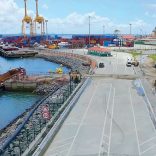Mozambique: Foreign exchange sales between banks plunged 67% last year
Mozambique Ports and Rail Evolution: Govt prepares new Ports Law, focus set on operational efficiency

Photo: Notícias
The government is preparing a preliminary new Ports Law aimed at increasing the operational efficiency of the national port system by attracting investments and removing obstacles hampering the exploitation of existing capacity.
The plan was disclosed in Maputo on Monday by Minister of Transport and Communications Carlos Mesquita at the opening of the Mozambique Ports and Rail Evolution Forum 2019, an event bringing together port and rail operators from the Southern African Development Community (SADC) and facilitating discussion of the challenges and achievements of the region’s ports.
The government intends the instrument in preparation to encourage the participation of the private sector, in the hope that it will invest in new infrastructure and explore the services and facilities offered by the sector.
The law, which is still in the pre-screening consultation phase with the main industry players, also provides incentives for the creation and rehabilitation of secondary and tertiary ports in Mozambique.
Mesquita said the government was also developing a tariff policy that would both encourage free competition in the ports and rail sector and render monopolies impossible, in the public interest.
“As a result of the implementation of the integrated transport development strategy approved by the government, the sector has since 2015 been achieving positive growth at an average annual rate of around 9 percent, despite adverse domestic and international circumstances,” he said.
Also at the event, the executive director of Maputo Port Development Company (MPDC), Osório Lucas, said that, since the government granted infrastructure management to his company in 2003, there had been a lot of investment in its modernisation.
The Port of Maputo concession model was a demonstration of what a public-private partnership could achieve, he said.
“The railway represents 27 percent of the total volume of cargo handled in Maputo Port – mostly nickel, phosphate and other minerals. But we still have about 400 truck carrying these products on our roads, so we need more investment to get these loads off the roads and onto the railway,” Lucas declared.












Leave a Reply
Be the First to Comment!
You must be logged in to post a comment.
You must be logged in to post a comment.